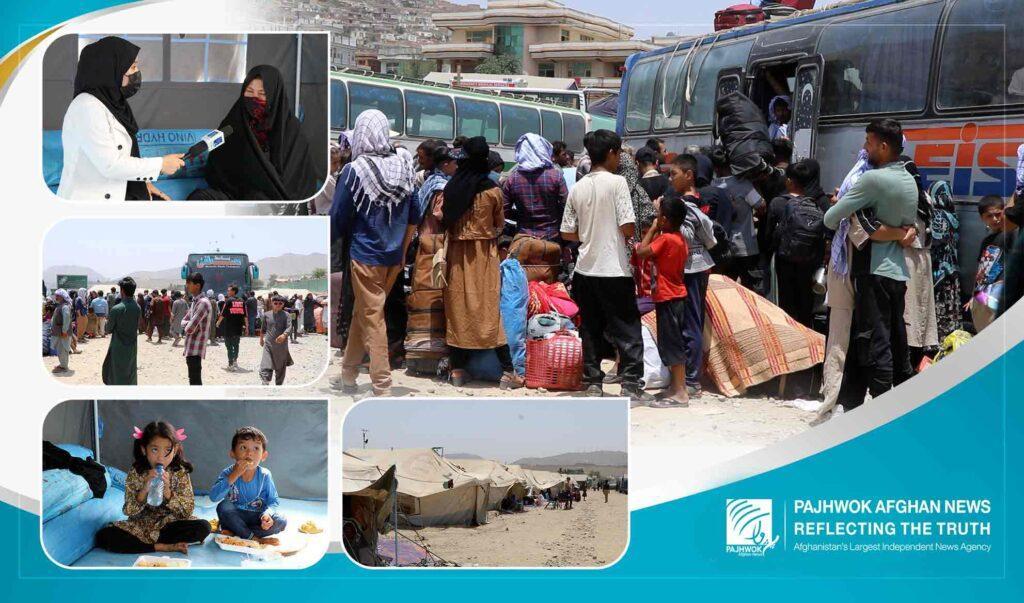Afghan Returnees Struggle With Joblessness, Trauma, Uncertainty
KABUL (Pajhwok): Some Afghan returnees from Iran say the bitter history of migration, empty-handed forced returns and unplanned life have faced them with economic problems and psychological stress.
The Ministry of Refugees and Repatriates (MoRR) says more than 1.6 million migrants returned from Iran, Pakistan and Turkey during the past five months.
Four decades of war and insecurity, unemployment, and economic problems are among the main factors driving millions of Afghans to migrate to neighboring countries, Europe, and the United States.
Most Afghan migrants in various countries, especially Pakistan, Iran, and Turkey, say they endured many difficulties during their migration, such as finding decent work, unfamiliarity with foreign languages and cultures, and access to educational and even health services.
One of the returnees: Now we wonder what to do?
Tahir, 35, a returnee who was forcibly deported from Iran says he let the country 12 years ago and immigrated to Iran with his family due to unemployment and economic difficulties.
Originally from Daikundi province, he added that he returned to the country from Iran alone without his family and spent eight days in Herat until his family returned.
“I cried all these days and almost had a stroke. I couldn't sleep at night and I was waiting for my family”.
Tahir, who was waiting with his family in camp in Sara-i-Shamali area of Kabul to go to Daikundi province, told Pajhwok Afghan News if he had not faced economic problems and unemployment, he would never have left the country and become an immigrant.
He sighed coldly and spoke about the bitter life in Iran, explained. He took his family to Iran with thousands of hardships and faced dozens of problems until he found work, and over the course of twelve years, he was arrested and beaten by the police many times.
He did not receive his monthly salary from his employer in Iran and returned to the country empty-handed. Homelessness and unemployment are among dozens of challenges he faces, and he has lost his comfortable life and cannot sleep at night in order to reorganize it, Tahir added.
“There are no jobs in the country, otherwise I would never have wanted to immigrate; Forced migration, forced return, now we wonder what to do”.
Taher's wife: My husband's memory is weak, he talks a lot.
Also, Fatima, Taher's wife, recounts the hardships of immigration to Iran, calling it the worst period of her and her family's lives.
“Life in Iran is not as easy as people think, and we were working on a cattle farm and tending an Iranian man's garden. We had just built a life for ourselves, but it was time for us to return home”.
Like her husband, Fatima is worried about how they would manage their lives, as they have returned to the country empty-handed.
She is concerned about Taher's health and said her husband's memory has weakened, due to the pressure of work and the violent treatment by the Iranian police.
“At first, my husband wasn't like this, but the pressure of work and the beatings by the Iranian police made him like this. He has become very talkative and sometimes even beats me and children for no reason”: she added.
But it is not only Taher's family that has a bitter story of migration. Bismillah, another returning refugee who returned to the country with his wife and three children spoke about the difficulties of migration and said he was scheduled to return to his home province of Kunduz in a few days.
He returned from Iran empty-handed.“The Iranian people thought of Afghans as their enemies. We were only able to bring a few of our belongings and other things were left there. I don't know what to do to find a bite of halal bread”.
Like Tahir, he has been complaining of insomnia and headaches, and claimed he is worried about how and in what way they will rebuild their lives.
Suicidal thoughts
Obaidullah, 42, a Kabul resident, who went to Iran with his family about a year ago due to unemployment and economic problems and was recently forcibly deported from that country, says:“Last year, I sold all my home assets and went to Iran with my wife, two sons, and four daughters. We started life anew in Mashhad. We all got jobs and almost started a good life when, unfortunately, the deportation of immigrants began”.
Two weeks ago, he was arrested and expelled by Iranian police while returning home from work. He added:“My wife and children are staying there. They kicked me out. I can't go myself, nor do I want my children to come. We have nothing here. We have no shelter, no work, no money to create a freelance job”.
Obaidullah is worried about the situation:“There is no escape from the difficulties in my life. Sometimes I think to myself that I should commit suicide to calm down”.
7 -year-old Fereshta: I don't know what to do here
Fereshteh is a 7-year-old child who was born in Iran and studied there until first grade, and has generally grown up with the culture of that country.
Now she has returned with her family and everything is different for her. She added with her childish eyes:“... I don't know what to do”
According to her, she hopes to continue her studies in the country and become a doctor in the future.
Psychology professor: Returning migrants suffer from mental, emotional stress
Zakaria Barakzai, a psychology professor at Darul Ma'alamin Syed Jamaluddin Afghan, said that migration is not just about leaving the country, but also has hidden dimensions; from a sociological perspective, one of the most important of which is the difficulty of adapting to new culture and norms, especially for those who migrate at an older age and find themselves torn between old and new values.
According to professor, psychologically, migration has profound effects on the psyche of individuals; immigrants often experience memory impairments, feelings of disorientation in their new environment due to language difficulties, and reduced interaction with family. This situation can inhibit a person from mental activity and cause anxiety, depression, and feelings of loneliness.
Barakzai said humans need social interactions, but in the immigration environment, these opportunities are taken away from them, resulting in the individual losing their social capital and facing new challenges in the host society, which sometimes have irreparable effects.
“Unfortunately, today we are witnessing the return of immigrants from Iran and Pakistan who feel alienated in their own country. For them, home, work, and education become major challenges. Even if they are able to integrate into their society, some of their time and energy are lost, and the psychological pressures remain with them”.
Haqqani: Besides assistance, we have plans in place to provide returnees with housing.
Spokesman for MoRR Abdul Mutalib Haqqani, told Pajhwok that from the beginning of this solar year to the end of (Asad), 1,626,058 people from Pakistan, Iran, and Turkey have returned to the country voluntarily and forcibly.
According to him, the government and aid agencies have provided cash, food, and non-food assistance to the returning refugees, and they have been transported to their original provinces.
“For these returning refugees, in addition to immediate assistance, the Islamic Emirate of Afghanistan has undertaken a high level of preparedness and plans for permanent solutions in the fields of housing, education, job opportunities, health, and other essential services”.
He said called on all international aid organizations and humanitarian countries to support MoRR in implementing these plans, so that their aid reaches the deserving in a transparent and effective manner and basic services are provided to returnees.
hz/ma

Legal Disclaimer:
MENAFN provides the
information “as is” without warranty of any kind. We do not accept
any responsibility or liability for the accuracy, content, images,
videos, licenses, completeness, legality, or reliability of the information
contained in this article. If you have any complaints or copyright
issues related to this article, kindly contact the provider above.
Most popular stories
Market Research

- Japan Buy Now Pay Later Market Size To Surpass USD 145.5 Billion By 2033 CAGR Of 22.23%
- BTCC Summer Festival 2025 Unites Japan's Web3 Community
- GCL Subsidiary, 2Game Digital, Partners With Kucoin Pay To Accept Secure Crypto Payments In Real Time
- Smart Indoor Gardens Market Growth: Size, Trends, And Forecast 20252033
- Nutritional Bar Market Size To Expand At A CAGR Of 3.5% During 2025-2033
- Pluscapital Advisor Empowers Traders To Master Global Markets Around The Clock






















Comments
No comment